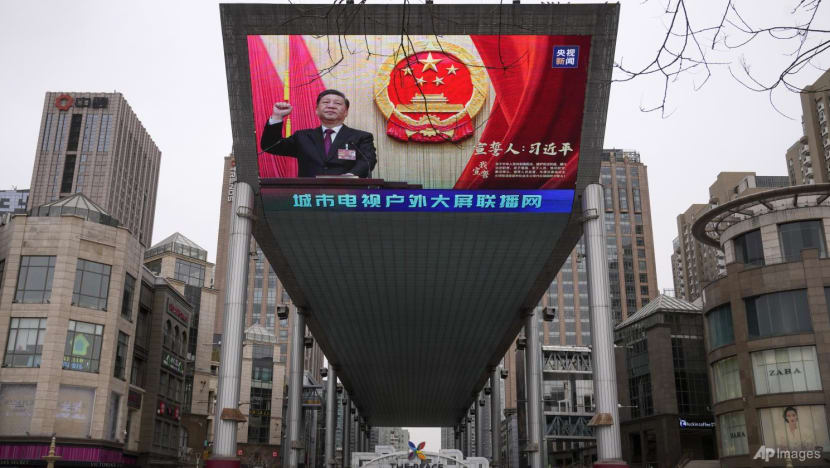5 key talking points from China's 'two sessions' and what they mean for the world
A look back at the highlights from the meetings of China's parliament and political advisory body over the last 10 days.

In this picture taken in Beijing on Mar 11, 2023, a large video screen shows an image of President Xi Jinping taking his oath after his re-election as China's leader. (Photo: AP/Andy Wong)
SINGAPORE: China's "two sessions" meetings wrapped up on Monday (Mar 13) following a number of major announcements and the confirmation of several key appointments over the course of 10 days.
The two sessions – the meetings of China's parliament and political advisory body – kicked off on Mar 4 and are the biggest events on the country's political calendar.
CNA spoke to three experts about the main talking points at this year's meetings.
XI JINPING'S THIRD TERM
While President Xi Jinping had already secured another five-year term as general secretary of the Chinese Communist Party (CCP) at a major congress last October, a largely ceremonial vote on Mar 10 made the extension of his presidency official.
The declaration of 69-year-old Xi as China's president for a historic third term sealed his place as the country's most powerful leader since Mao Zedong.
Nearly 3,000 members of China's parliament, the National People's Congress (NPC), voted unanimously in the Great Hall of the People for Xi to be president in an election where there was no other candidate.
He also received unanimous votes for a third term as chairman of the country's Central Military Commission.
What can China, the United States and the rest of the world expect during this term?
"Current indications are that Xi's third term will likely involve the further concentration of authority under the party," said Associate Professor Chong Ja Ian from the Department of Political Science at the National University of Singapore.
Businesses and organs of state are likely to see even more party oversight, he added.
"Outwardly, Xi is likely to face the US challenge robustly. This means contesting for influence globally and putting pressure on Taiwan – as well as US allies – regionally."
Assistant Professor Benjamin Ho, coordinator of the China Programme at Nanyang Technological University's S Rajaratnam School of International Studies, also sees challenging foreign relations taking centre stage during Xi's third term.
"Xi will encounter a more hostile world – particularly in the West – towards China," he said.
"He would have to find ways to repair some of the broken bridges with countries while at the same time shoring up support towards himself and the party back home."
Professor Henry Gao from the Singapore Management University's Yong Pung How School of Law expects to see further crackdowns in the financial sector, and more efforts to upgrade China's technology development and reduce reliance on foreign technology.
He also pointed to the restructuring of the central government as a significant development from the meetings.
"By taking away powers from the State Council, the power of the CCP is further enhanced and this would have major implications for China's governance for many years to come," he said.
CHINA'S NEW PREMIER
Another appointment confirmed by the NPC saw China get its first new premier in a decade – Li Qiang.
He succeeded Li Keqiang, who confirmed last year that he would be stepping down as premier after reaching his two-term limit.
Billed as a loyal enforcer of Xi's policies, Li Qiang was Shanghai's Communist Party boss, pushing local officials to react quickly to address companies' needs as a means to fire up the local economy.
He is regarded as the most pro-business politician in Xi's inner circle and is believed to have been behind a variety of policy changes, including the abandonment of China's zero-COVID policy last December.
Prof Gao said that while Li Qiang is a close ally of Xi, he has shown that he can "be more pragmatic in his governance style".
"He could potentially soften some of the harsh policies," he added.
Assoc Prof Chong, on the other hand, said that Li - being a loyal party person with close ties to Xi - will likely be "an effective enforcer and executor of Xi's directives".
Asst Prof Ho thinks that it is too early to tell what kind of premier Li will be.
"If speculation (is) to be believed, Li Qiang is more likely to be trusted by Xi compared to his predecessor, but in politics – particularly Chinese politics – nothing is cast in stone," he said.
"Intraparty politics could generate all sorts of problems in the future, particularly if factions vie for influence."
Making his public debut as premier in a wide-ranging media conference on Monday, Li sought to reassure the country's private sector, saying that the environment for entrepreneurial businesses will improve and that equal treatment will be given to companies, regardless of ownership type.
He also warned of "many new challenges" to China's growth and hit out at the US during the briefing.
"Encirclement and suppression are not advantageous for anyone," he said.
"China and the United States should cooperate, and must cooperate. When China and the US work together, there is much we can achieve," he added.
STRONG WORDS FOR THE US, ASEAN
Speaking on Mar 7, Xi said that the US was leading a "containment, encirclement and suppression of China" as he urged his country's private sector to boost innovation and become more self-reliant.
China's technology ambitions have been hit with a raft of restrictions by the US and its Western allies, and Beijing has doubled down on the need to shift away from imports for sectors perceived as vital to national security, such as semiconductors and artificial intelligence.
In a rare direct criticism of the US, Xi told industry leaders that "Western countries led by the United States have implemented all-round containment, encirclement and suppression of China, which has brought unprecedented severe challenges to our country's development".
Assoc Prof Chong said that Xi's direct criticism of the US was significant as it sets the tone for other officials and policy.
Prof Gao also highlighted the significance of Xi's remarks on the US, in the context of proposed legislation to counter foreign sanctions.
"China will take a more confrontational approach with the US, as indicated by Xi's remarks at the two sessions where he encouraged everyone to 'dare to struggle'," he said.
During the meetings, China's Foreign Minister Qin Gang also said that the US should change its "distorted" attitude towards China or "conflict and confrontation" will follow.
"If the United States does not hit the brakes, and continues to speed down the wrong path, no amount of guardrails can prevent derailment, which will become conflict and confrontation, and who will bear the catastrophic consequences?" he said during his first news conference after becoming foreign minister last December.
Qin was previously China's ambassador to the US. He was appointed state councillor on Mar 12.
The foreign minister also said that the Association of Southeast Asian Nations (ASEAN) should stay clear of any power rivalry between big countries.
He said that the Indo-Pacific strategy by the United States is an attempt to form "exclusive cliques" that hurts the interests of regional countries, adding that any attempt to encircle China is bound to fail.
"It will only lead to impact on the ASEAN-centred, open and inclusive regional cooperation architecture, and will undermine the overall and long-term interests of regional countries," he said.
Related:
BIGGER DEFENCE BUDGET
The comments from Xi and Qin came after an increase in military spending was announced.
As China unveiled its 1.55 trillion yuan (US$225 billion) defence budget, outgoing premier Li Keqiang told NPC delegates that "external attempts to suppress and contain China are escalating".
"The armed forces should intensify military training and preparedness across the board," he said.
The military, he added, must "devote greater energy to training under combat conditions, and ... strengthen military work in all directions and domains".
This year's 7.2 per cent hike in defence spending marked the eighth consecutive single-digit increase. As in previous years, no breakdown of the spending was given, only the overall amount and the rate of increase.
Beijing's military budget is the second-largest in the world after Washington's and last year stood at 1.45 trillion yuan, although many overseas analysts say much more money is spent than the officially announced sums.
Assoc Prof Chong said: "The budget shows steady growth, but the statements surrounding the budget on external threats coupled with strident language from Qin Gang and Xi Jinping regarding competition with the United States indicate a desire to further bolster (China's) ability to employ force."
Asst Prof Ho said the budget indicates that China would want to operate from a position of strength with regard to foreign relations.
"A strong defence budget sends a signal that China will not compromise on its military power as a bedrock of its external relations," he said.
Taiwan featured prominently during the meetings, with Li Keqiang emphasising the need for "peaceful reunification" with the self-ruled island, and Xi saying that China must oppose pro-independence and secessionist activities and the interference of external forces there.
Prof Gao said that the surge in military spending could be related to Taiwan.
"The increase in the budget implies a higher likelihood of military conflicts in the next few years, probably over Taiwan," he said.
LOWEST GROWTH TARGET IN DECADES
China announced one of its lowest economic growth targets in decades. In an opening report, the Chinese government said it would aim for economic growth of "around 5 per cent" for the coming year – its lowest since 1991.
China posted 3 per cent growth last year, missing its stated target of around 5.5 per cent by a wide margin as the economy strained under the impact of strict COVID-19 containment policies and a real estate crisis.
Analysts said that the target is in line with a global slowdown and is a natural progression as the world's second-largest economy matures.
"The lower growth target suggests cautiousness at coming out of zero-COVID, recognition of the need to adjust to (China's) maturing economy, and an accounting of the pressure from competition with the United States," said Assoc Prof Chong.
Prof Gao said that while the period of double-digit high growth is over, China is at the same time trying to maintain growth and "focus on the quality rather than the quantity of growth".
Asst Prof Ho said people should not read too much into the target.
"On the surface, it suggests the Chinese economy will encounter a slowdown, but that is to be expected for all economies," he said.
"More importantly, China may have to redistribute its emphasis of being an export-oriented economy to generating domestic consumption."

















